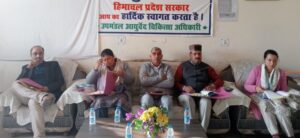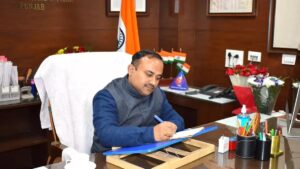NDHM, a landmark initiative towards universal quality healthcare- Rajeev Ranjan Roy

Chandigarh / 27 August / New Super Bharat News
As a country of 135 crore people, India has all reasons to be proactive, innovative and focussed to ensure quality, affordable and ethical universal healthcare for all. Health facilities — private or public – require to be responsive to people’s emergency and routine needs. The Centre and States are continuously working to make affordability in the health sector a reality. However, equally challenging is the task to ensure efficacy of existing health facilities, resources and their real time response during the need of the hour. Hence, the need for National Digital Health Mission (NDHM), which addresses a host of issues and constraints to strengthen India’s healthcare delivery systems. It has all potential to be a milestone on India’s road to achieve the goal of universal healthcare,
As India remains committed to make high quality healthcare accessible to all up to the last mile, digital health interventions have a huge role to play. In the words of J Satyanarayana, former chairman, UIDAI and chairman of the National Digital Health Blueprint (NDHB) Committee, digital health services will be the “biggest leap of the Government of India (GoI) towards achieving the goal of universal healthcare coverage (UHC) with an impetus on digital healthcare component.” For long, the need has been felt for a common platform for the integration of existing applications in health domain and data which has existed in silos either in public or private healthcare facilities in India, which is now being fulfilled in the form of NDHM.
To quote Union Health and Family Welfare Minister Dr Harsh Vardhan, “the need of the hour is to create an ecosystem which can integrate the existing disparate health information systems and show a clear path for upcoming programmes. There is a need to ensure convergence across these IT systems to monitor and provide health services in a robust and efficient manner.” Needless to say that real time critical intervention remains a major challenge so far as our health delivery system is concerned. Though over the years information technology (IT) has been adopted in the health sector immensely, a lot is still to be done, particularly in the field of making medical services accessible to all, a realisation which dawned upon us so explicitly during our fight against the coronavirus pandemic.
Under the NDHM, health identity (ID) will be given to every Indian, which will contain details of every test, disease, doctors visited, medicines taken and diagnosis. The information contained in the NDHM ID will not only be foolproof but also portable and easily accessible even if the patient shifts to a new place and visits a new doctor. It is a holistic, voluntary healthcare programme which integrates doctors, hospitals, pharmacies, insurance companies and makes a digital health infrastructure. Like eSanjeevani, Jan Oushadhi, the Pradhan Mantri Jan Arogya Yojana (PMJAY, perhaps the largest health assurance scheme in the world providing a health cover of Rs 5 lakh per family per year for secondary and tertiary care hospitalization, the digital health cards will help doctors treat patients accessing their past medical history.
To ensure that India’s leap towards digitization of health services is taken to its logical conclusion seamlessly and transparently, the National Health Authority (NHA), the apex agency responsible for the implementation of AB-PMJAY, has been tasked to design, build, roll-out and implement the NDHM in the country. Currently, the scheme has been rolled out as a pilot project in six Union Territories — Chandigarh, Ladakh, Dadra and Nagar Haveli and Daman and Diu, Puducherry, Andaman and Nicobar Islands and Lakshadweep.
According to NHA, the NDHM aims to liberate citizens from the challenges of finding the right doctors, seeking appointment with them, payment of consultation fee, making several rounds of hospitals for prescription sheets and will empower all Indians with the correct information and sources enabling them to take an informed decision to avail the best possible healthcare. The new initiative consists of six key building blocks or digital systems – HealthID, DigiDoctor, Health Facility Registry, Personal Health Records, e-Pharmacy and Telemedicine. The core building blocks such as Health ID, DigiDoctor and Health Facility Registry (HFR) shall be owned, operated and maintained by the Central government. So far as private sector players are concerned, they will also have an equal opportunity to integrate with these building blocks and create their own products for the market. However, core activities and verifications, for example, generation of health ID or approval of a doctor or facility shall remain with the government.
It is worth stating here that NDHM is in tune with the spirit of the National Health Policy – 2017 (NHP—2017) , which focuses on addressing the current and emerging health challenges necessitated by the changing socio-economic, technological and epidemiological landscape. The NHP-2017 advocates extensive deployment of digital tools for improving the efficiency and outcome of the healthcare system and aims at an integrated health information system which serves the needs of all stake-holders and improves efficiency, transparency, and citizen experience. Advocating for progressively incremental assurance-based approach with focus on preventive and promotive healthcare, the NHP-2017 recommends linking the health card to primary care facility for a defined package of services anywhere in the country. NHP—2017 envisages providing a larger package of assured comprehensive primary healthcare and attaining the highest possible level of health and well-being for all at all ages through preventive and promotive healthcare and universal access to quality health services without anyone having to face financial hardship as a consequence.
Alive to the contours of NHP-2017, the current dispensation at the Centre under the overall leadership of Prime Minister Narendra Modi has ensured that adequate funds are allocated to the health sector. In the Union Budget 2017-18, the Central government provisioned Rs 47352.51 crore to Ministry of Health and Family Welfare (MoHFW). This was a 27.7 per cent increase in allocation over the previous year. In 2018-19 as well, there was an increase of 11.5 per cent in the outlay of health over 2017-18 with allocation of Rs.52,800 crore. Also, Rs 24,908.62 crore was provided for the National Health Mission (NHM) in 2018-19, Rs. 2967.91 crore more than the last year’s allocation. Rs 62,659.12 crore outlay was earmarked for the health sector in the Union Budget for 2019-2020 fiscal, the highest in the last two financial years. The sincerity, with which the Central government is working to bring transparency and affordability in the health sector without compromising with its quality, will go a long way in laying the foundation of a strong India.




